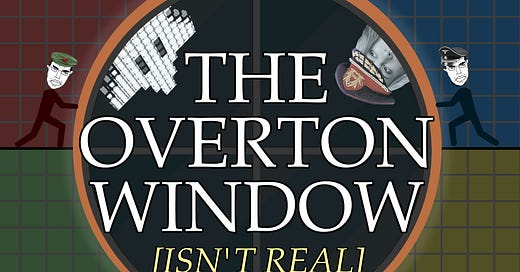Hello everyone, Podcasts are finally reuploading and we’ve got more articles coming soon also! AntiPolitics is back, so thank you for for sticking with us.
Donate: https://ko-fi.com/scrumpmonkey
Our Telegram: https://t.me/EvScr123
Scrump's Discord: https://discord.com/invite/dSfZsaAzGn
RESEARCH NOTES
Joseph Overton:
https://en.m.wikipedia.org/wiki/Joseph_Overton
“That idea eventually became known as the Overton window, and his lasting legacy.[4] He opined that it is the responsibility of think-tanks to propose policies outside the window and shift the window.”
The Mackinac Centre of which Joseph was the VP
(Worth reading both of these in full as they are just Heeb word magic)
https://www.mackinac.org/OvertonWindow
https://www.mackinac.org/OvertonWindow#faq
From what we can see it appears the original idea from Overton himself was more focused on the specific role of think tanks, limiting the scope of influential voices/organisations to the client groups.
Where in more contemporary descriptions of the “Overton Window” there is a greater emphasis on “social change” or appeal to a wider, flatter, and more homogenous concept of public opinion.
Prior to the revolution of mass and scale the “overton window”, would have made no sense, as there was no such thing as consensus based rule, at least not to the extent that it appears to exist today, ergo a consensus around “acceptable” ideas or policies would never be required.
The Overton Window is based fundamentally in democratic “bottom-up” thinking, and further on the “marketplace of ideas” by making the conversation move from friend/enemy, and more realist analysis, into useless cul-de-sacs of debating ideas “on their own merit”.
Joseph G Lehman (https://www.mackinac.org/about/staff/1) colleague of Overton and purported to be the one to give the concept overton’s name posthumously:
https://www.mackinac.org/12481
“Many believe that politicians move the window, but that's actually rare. In our understanding, politicians typically don't determine what is politically acceptable; more often they react to it and validate it. Generally speaking, policy change follows political change, which itself follows social change. The most durable policy changes are those that are undergirded by strong social movements.”
Deliberately backwards conception, as we all know “Culture is downstream from law”
Jacobin socialist gives up on “muh Overton window”
https://jacobin.com/2020/09/joseph-overton-window-bernie-sanders
“The problem with the Overton window” & “radical politics without Overton delusions” are a must read.
“The propagandist therefore does not normally address himself to the individual's intelligence, for the process of intellectual persuasion is long and uncertain, and the road from such intellectual conviction to action even more so. The individual rarely acts purely on the basis of an idea. Moreover, to place propaganda efforts on the intellectual level would require that the propagandist engage in individual debate with each person—an unthinkable method. It is necessary to obtain at least a minimum of participation from everybody.
It can be active or passive, but in any case it is not simply a matter of public opinion. To see propaganda only as something related to public opinion implies a great intellectual independence on the part of the propagandee, who is, after all, only a third party in any political action, and who is asked only one opinion. This obviously coincides with a conception of liberal democracy, which assumes that the most one can do with a citizen is to change his opinion in such fashion as to win his vote at election time.
The concept of a close relationship between public opinion and propaganda rests on the presumption of an independent popular will. If this concept were right, the role of propaganda would be to modify that popular will which, of course, expresses itself in votes. But what this concept does not take into consideration is that the injection of propaganda into the mechanism of popular action actually suppresses liberal democracy, after which we are no longer dealing with votes or the people's sovereignty; propaganda therefore aims solely at participation. The participation may be active or passive: active, if propaganda has been able to mobilize the individual for action; passive, if the individual does not act directly but psychologically supports that action.”
Ellul Propaganda page 26
Overton’s original conception, that it was think tanks and those whose job it is to invent the political future that guides public opinion, is partially true but with one very big caveat: these organisations must seek patronage to exist. They are not “profitable” in any traditional sense. As we have extensively mapped out, all policy crafting organisations of note have deep links to the security state. Chatham House being the most long standing and obvious form of that.
>Containment arc. Information laundering via NGOs, Push from ‘outside’ via these NGOs.
Polling is meant to craft public opinion, not measure it -because “public opinion” isn’t real it is malleable. “Public Opinion” is the invention of those who supposedly measure and codify it, all of which have high degrees of security state backing. The Sovereign is he who tells the public what their opinion is.
The Security State uses the lie of bottom up change to cover their security operations: this should be obvious, unless you actually believe the Arab Spring was a spontaneous outpouring of love for democracy or the 2014 colour revolution in Ukraine was more motivated by water cooler chatter than it was by CIA rifles at influential people’s backs. “The Overton Window” is no match for a bombing campaign.
The Ellul Window:
The Ellul Window, as an alternate formation to The Overton Window might be something like this:
What is considered a “socially acceptable belief” in a mass society is shaped by the ruling elite. This is communicated using propaganda and is enforced by the legal system and ultimately through violence.
What is ‘culturally acceptable’ to say in a mass society is guided by legality, because in western nations most of the population is deeply averse to breaking the law. Without the lie of democracy as a fig leaf, you can plainly see that law is imposed from above on a population by The Elite to guide the behaviour of The Mass. This is enforced by the ever closer informational management of society technology has allowed via greater avenues for propaganda, through dependent intermediaries in the press.
The Power centre in modern managerial states are the security services, it is they who shape “the conversation” to their benefit via the use of a hard power backstop of assassination, imprisonment, bribery and blackmail. They are able to move as “the exception,” and therefore become sovereign.
The edges of The Ellul Window are hard, they cannot be pushed, and they create a container that all political conversations must fit into in order to remain “acceptable,” We are then told that this strictly enforced conversation, under threat of arrest, is simply the “bottom up” shape of what people believe.
NGOs, Think Tanks and supposedly popular movements that are supported by the security state are able to create the illusion of bottom up change: they manufacture consent. In this way The Overton Window as a concept is not only flawed but an inversion of reality.
“Cheering the Quarterback” and the democratic protagonist illusion.
[memes]














Share this post